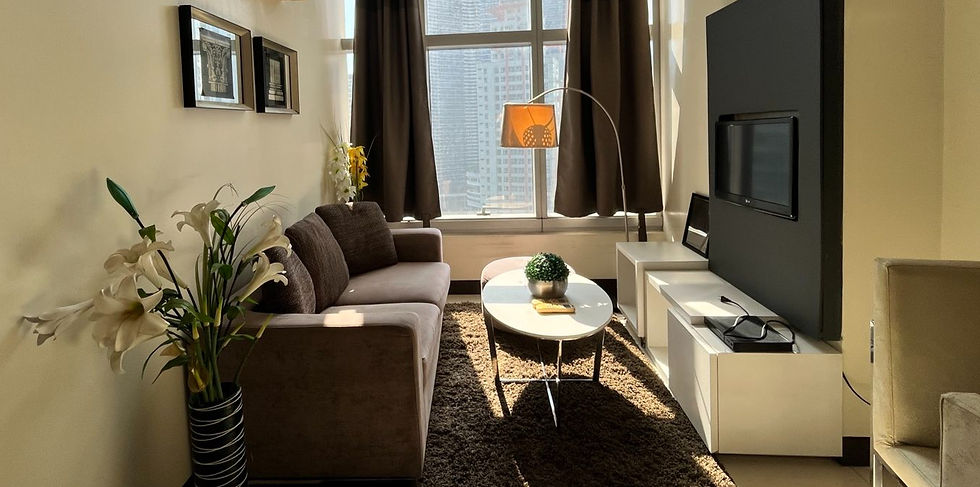Legal Insights 2025: Renting an Apartment in the Philippines Under the Rent Control Act
- bedandgoinc
- 2025年10月3日
- 読了時間: 4分
October 3,2025

Renting an apartment in the Philippines in 2025 remains an attractive option for locals, expatriates, and digital nomads alike. With competitive prices, expanding urban centers, and clear legal frameworks, the country offers a mix of convenience and protection for both tenants and landlords. The Rent Control Act (Republic Act No. 9653)—along with its latest implementing guidelines—continues to regulate residential lease agreements, ensuring fair practices in the rental market.
Below are the key legal protections and practical considerations every renter should know before signing a lease this year.
1. Location is Crucial
When selecting an apartment, consider proximity to workplaces, safety, and access to public transportation or essential services. Metro Manila cities like Makati, BGC, and Ortigas command higher rental rates than suburban or coastal areas like Cavite or Batangas. Neighborhood security, flood history, and travel time to business districts can significantly impact your living experience and monthly budget.
2. Budget Planning and Market Affordability
The Philippine rental market in 2025 still offers a wide spectrum of price points—from budget studios to luxury penthouses. Urban condos typically offer modern amenities and strategic locations, while provincial apartments provide more space at lower rates. Set a clear monthly budget that covers not only rent but also utilities, association dues, and transportation.
3. Review the Lease Contract Thoroughly
Before signing any lease, carefully check:
Ownership and property title to ensure legitimacy
Rental terms, duration, renewal conditions, and escalation clauses
Advance and deposit payments (usually 1 month advance and 2 months deposit)
Maintenance responsibilities, termination policies, and penalties
Never rely on verbal agreements. All terms should be clearly written and signed by both parties.
4. Conduct a Proper Property Inspection
Before moving in, inspect the property carefully—walls, flooring, lighting, appliances, plumbing, and furniture. Document any defects with photos and request written acknowledgment from the landlord. This protects you from future disputes over damages.
5. Check Furnishings and Fixtures
Many urban rentals come fully furnished. Assess whether the provided furniture is clean, functional, and suits your lifestyle. Well-maintained furnishings can help you save on setup costs and make moving in smoother.
6. Network Connectivity
Reliable mobile and internet connectivity is non-negotiable in 2025, especially for remote workers. Test signal strength and check available broadband providers in the building or neighborhood.
7. Utilities and Basic Services
Ensure that water, electricity, and internet connections are readily available and stable. Review your lease for clauses on who pays utility bills and how interruptions are handled. Ask about backup power (especially in condominiums) to prepare for occasional outages.
8. Safety and Security Features
Evaluate the building or neighborhood's security measures—such as 24/7 guards, CCTV, gated entry, and fire safety systems. A safe living environment is essential not only for peace of mind but also for insurance and compliance with local regulations.

2025 Legal Overview: Rent Control Act (Republic Act No. 9653)
The Rent Control Act, continuously extended by the Philippine government, regulates residential rental units within certain price brackets. Here are the updated key legal protections as of 2025:
1. Annual Rent Increase Cap – 7%
For units covered under the Act (typically those renting for ₱10,000 and below per month in urban areas, or ₱5,000 and below in other areas), annual rent increases are capped at 7% as long as the same tenant occupies the property. This safeguard protects tenants from sudden and excessive rent hikes. Rent can only be reset to market rate once the tenant vacates.
2. Suggested Payment Date
The recommended rental due date is within the first five (5) days of each month, unless otherwise agreed in the contract. Flexibility is allowed through mutual agreement, provided it is clearly documented.
3. Subleasing Regulations
Subleasing without written consent from the owner is prohibited. Tenants must secure explicit written approval if they plan to sublease any part of the property. Unauthorized subleasing is a valid ground for contract termination.
4. Legal Grounds for Ejectment
Landlords can legally repossess their property only on specific grounds:
Non-payment of rent for three consecutive months
Unauthorized subleasing
Owner's legitimate need to use the property (with proper notice)
Expiration or violation of contract terms
In cases where the landlord reclaims the property for personal use, the tenant must be given the first option to re-lease once it's available again.
5. Protection in Case of Sale or Mortgage
If the property is sold or mortgaged, the new owner must honor the existing lease. Tenants cannot be evicted until the lease term ends, ensuring continuity and stability even during ownership changes.

Renting an apartment in the Philippines in 2025 is a balance of practical preparation and legal awareness. By understanding the provisions of the Rent Control Act, inspecting the property carefully, and reviewing contracts diligently, tenants can secure fair agreements and avoid costly disputes.
Whether you're an expat settling in Manila, a local professional moving closer to work, or an investor leasing out a property, knowing your rights and obligations ensures a smooth and lawful rental experience in the Philippines.
Source:









コメント